Key takeaways:
- Understanding the importance of encryption and two-factor authentication enhances online banking security.
- Regularly monitoring bank accounts and utilizing strong passwords can prevent fraud and unauthorized transactions.
- Always ensure secure connections, especially when using public Wi-Fi, to protect personal information.
- Be vigilant against phishing attempts by carefully scrutinizing emails and links for authenticity.
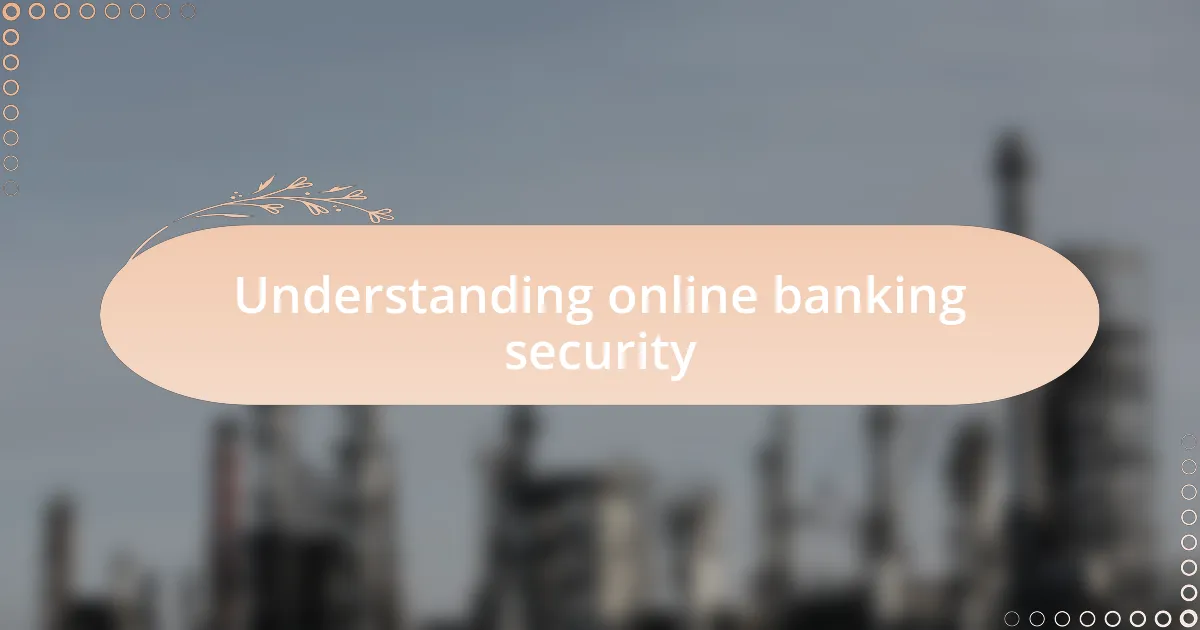
Understanding online banking security
Understanding online banking security is crucial in today’s digital age. I remember the first time I transferred money online—my heart raced with a mix of excitement and anxiety. I had to ask myself, “Is my information secure?” This is a question many people face, and the truth is, security begins with understanding how your bank protects your data.
Encryption is a key component of online banking security, acting like a digital lock on your personal information. This technology scrambles your data, making it nearly impossible for anyone to read it without the proper keys. When I learned about encryption, it felt reassuring to know that my sensitive information, like account numbers and passwords, was being shielded from prying eyes.
Moreover, two-factor authentication adds another layer of protection, serving as a safety net for my online transactions. Initially, I thought it was just an extra step to slow me down, but once I experienced it, I appreciated the added security. It made me think—why risk my financial safety when these measures are so easily accessible? Engaging in safe online practices, like regularly updating passwords and using secure networks, can greatly enhance your security experience while banking online.
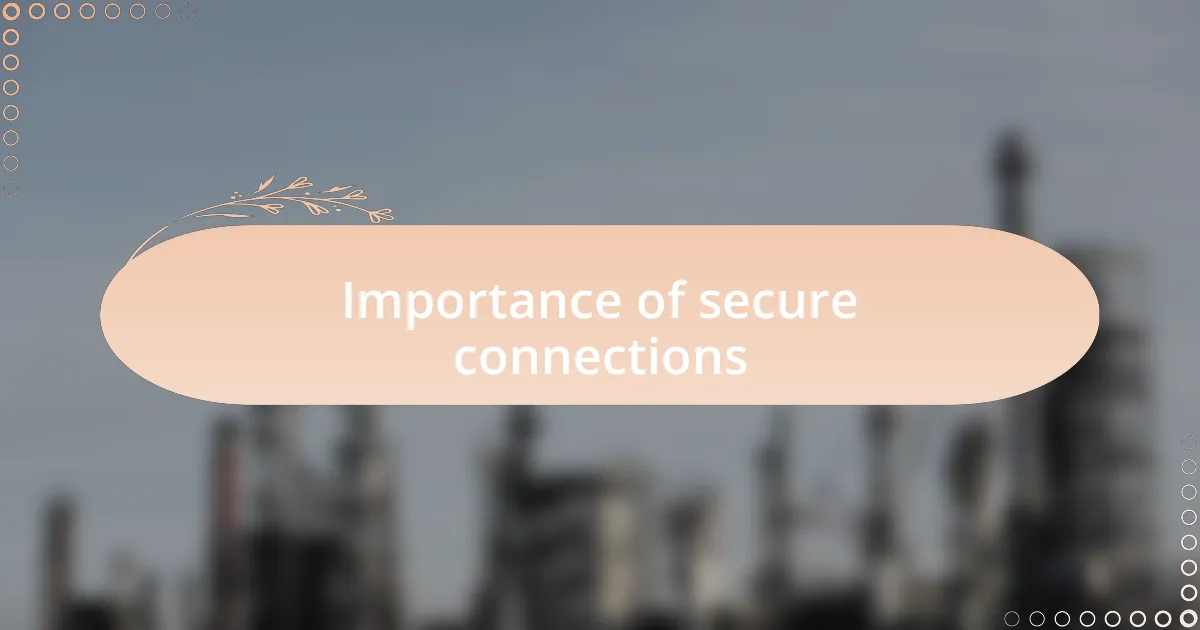
Importance of secure connections
Secure connections are essential when engaging in online banking. Whenever I log into my bank account, I take a moment to confirm that the connection is secure. It gives me that comforting feeling, almost like checking the locks on my front door before leaving home. If the lock isn’t secure, why would I trust my valuables inside?
I still vividly remember an incident where I accidentally connected to an unsecured Wi-Fi network at a café. My instinct was to cancel my online banking session immediately. The thought of my private information being exposed sent a chill down my spine. It really made me appreciate how crucial it is to only bank over encrypted connections, as they significantly reduce the risk of data theft.
Using a VPN can also enhance my security when banking online. I once found myself traveling abroad and realized that public networks can be a hotbed for cyber attacks. That’s when I decided to invest in a reliable VPN service. It was a game-changer! Not only did I feel more secure, but I also gained peace of mind knowing my online activities were shielded from hackers. Isn’t that worth the small investment?
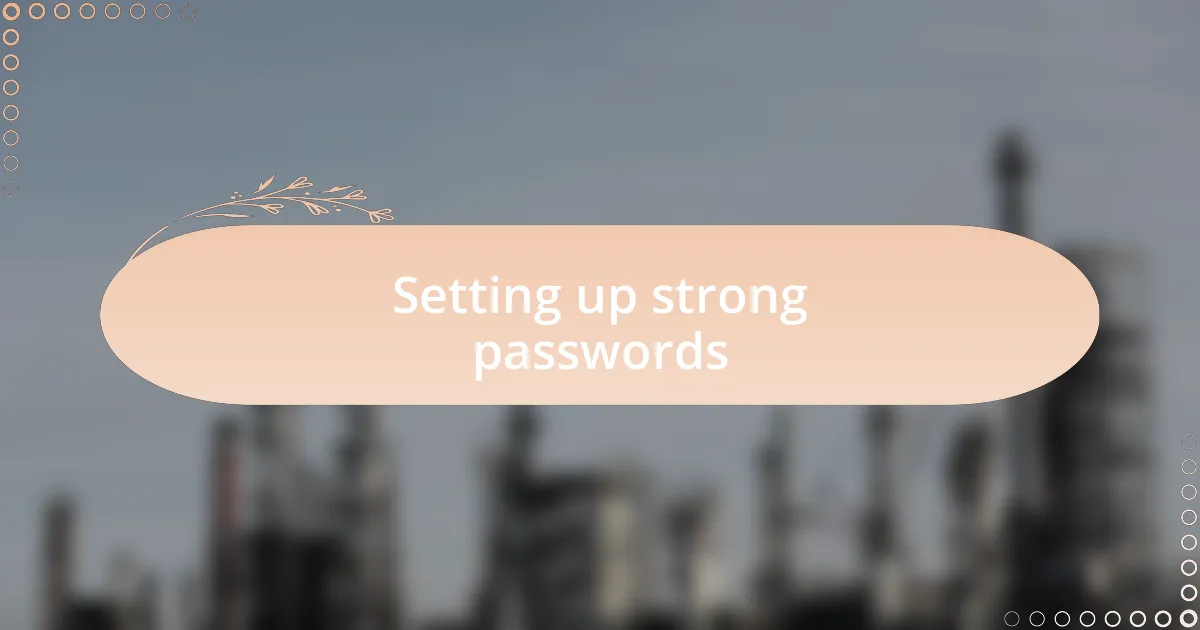
Setting up strong passwords
Setting up strong passwords is one of the simplest yet most effective steps I take to protect my online banking. I prefer using a mix of upper and lower-case letters, numbers, and special characters. The last time I revamped my passwords, I felt a sense of empowerment, knowing I was building a formidable fortress around my sensitive information.
When I create passwords, I always avoid easily guessed options like birthdays or pet names. I remember a friend who had his account hacked simply because he used “password123.” It was a solid reminder that a little creativity in crafting unique passwords can make a world of difference. After all, wouldn’t you feel better knowing your password is not a common choice?
I also utilize password managers to keep track of my many passwords. At first, I was hesitant, fearing it would add complexity, but once I got the hang of it, it truly simplified my life. The idea of having secure, randomly generated passwords for all my accounts without the need to remember them all is liberating. Think about it—wouldn’t you prefer to focus on managing your finances rather than fumbling with password resets?
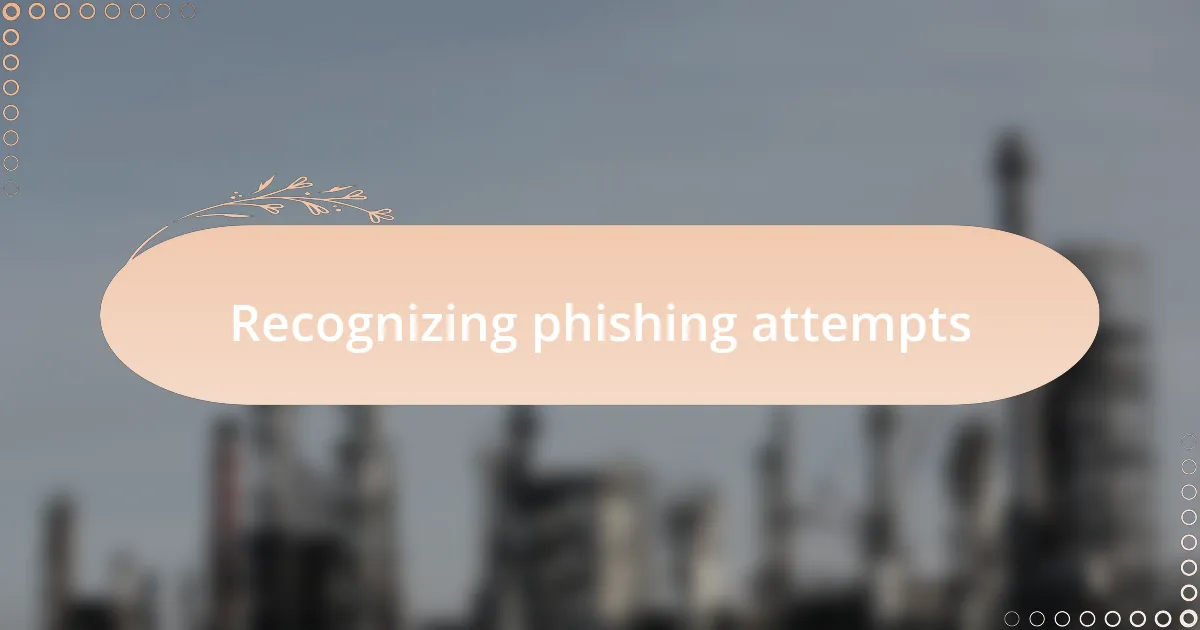
Recognizing phishing attempts
Phishing attempts can be incredibly deceptive, often masquerading as legitimate emails or messages from trusted institutions. I vividly recall an email that appeared to be from my bank, urging me to verify my account details urgently. The moment I noticed the slight variation in the email address, my instincts kicked in—a clear warning sign that not everything was as it seemed. Have you ever received similar emails? It’s unsettling how closely they can mimic real communications.
When examining communications, I make it a habit to scrutinize the content closely. Phishing messages frequently contain poor grammar or awkward phrasing, making it seem less professional. I once received a message with a hefty dose of urgency, prompting me to click a link fast. It was incredible how my anxiety about missing a deadline had clouded my judgment. I remind myself to pause and ask—does this really feel right?
Links in emails can be particularly treacherous. Even if it appears legitimate, I always hover over the link to check the URL before clicking. There was a time when I clicked a link without this precaution, leading me to a spoofed website. I immediately felt a cold wave of panic wash over me. Learning to take that extra second to validate can be a game changer—what would you do if you found yourself in a similar situation?
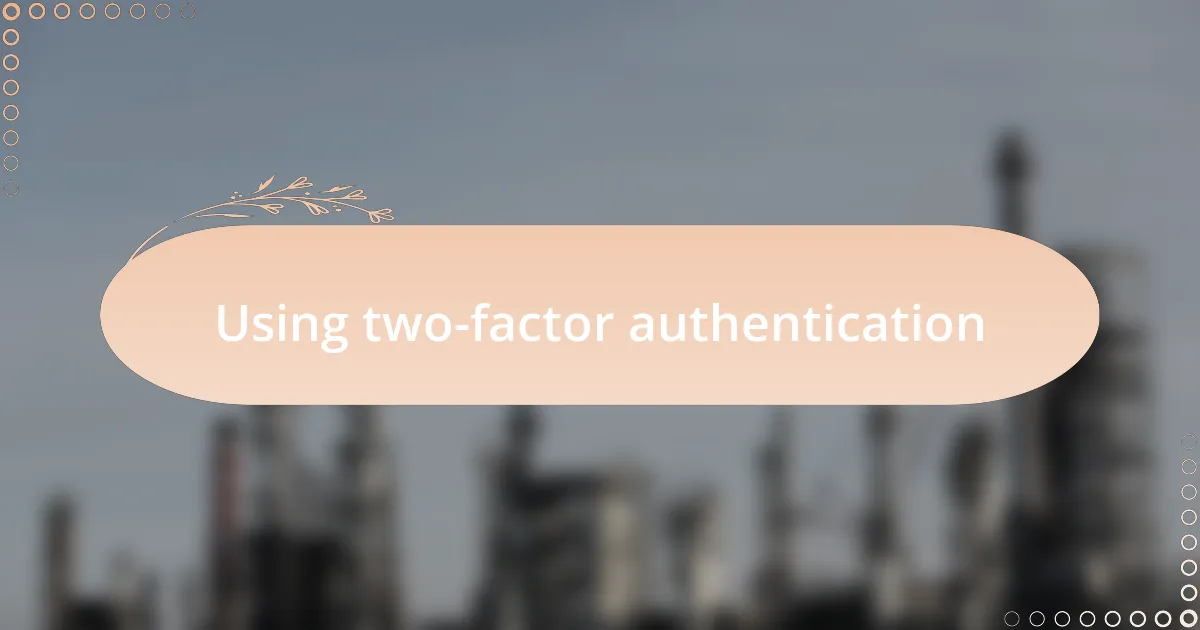
Using two-factor authentication
Using two-factor authentication adds an extra layer of security that I find essential in today’s digital banking world. The first time I set it up, I felt a sense of relief; it was like placing a heavy lock on my front door. Have you ever experienced that moment of peace when you know you’re taking proactive steps to protect yourself?
I remember the day my bank sent me a text code for verification. It caught me off guard at first, but then I realized how crucial this step was after hearing about friends falling prey to account takeovers. Just the thought of someone accessing my financial information without permission fills me with anxiety. Understanding that this two-step process can significantly reduce the risk is empowering, don’t you think?
It’s interesting to reflect on how I once viewed extra security measures as an inconvenience. However, the peace of mind I gain from those extra seconds of entering a code is invaluable. Imagine the frustration of losing access to your hard-earned money because you skipped this step—it’s a scenario I never want to face. By embracing two-factor authentication, I feel more in control of my online banking safety.
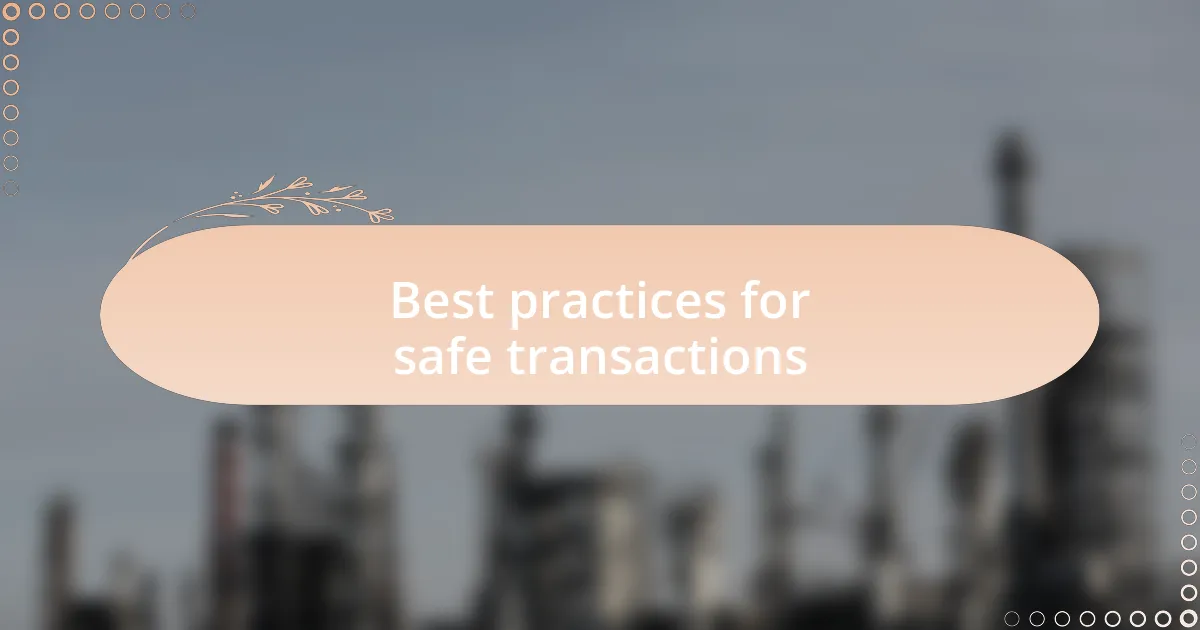
Best practices for safe transactions
Practicing good password hygiene is another cornerstone of safe online transactions. I vividly recall the moment I learned the hard way that using “password123” just wouldn’t cut it. One day, I realized I’d unknowingly set myself up for a security breach when I stumbled upon an old password list in a breach notification. It was an eye-opener, reminding me that strong, unique passwords are essential. Have you ever considered how a simple tweak could save your financial life?
Regularly monitoring your bank statements is key to catching any suspicious activity early. There was a time when I brushed aside monthly statements, assuming everything was fine. One day, I took a closer look only to find an unfamiliar transaction. The feeling of panic was immediate, but quickly checking my account helped me spot and report the fraudulent charge before it spiraled out of control. How often do you really dive into your financial records? I can tell you, making it a habit can shield you from nasty surprises.
Lastly, using secure connections for online transactions cannot be overstated. I remember logging in at a café while connected to their public Wi-Fi. The moment I hit ‘submit’, an unmistakable chill ran up my spine as I realized I was at risk. It’s a lesson I won’t forget; I now always wait until I’m on a secure home network. When browsing or banking online, does the connection you use cross your mind? It should, because safeguarding your data starts with the network you choose.
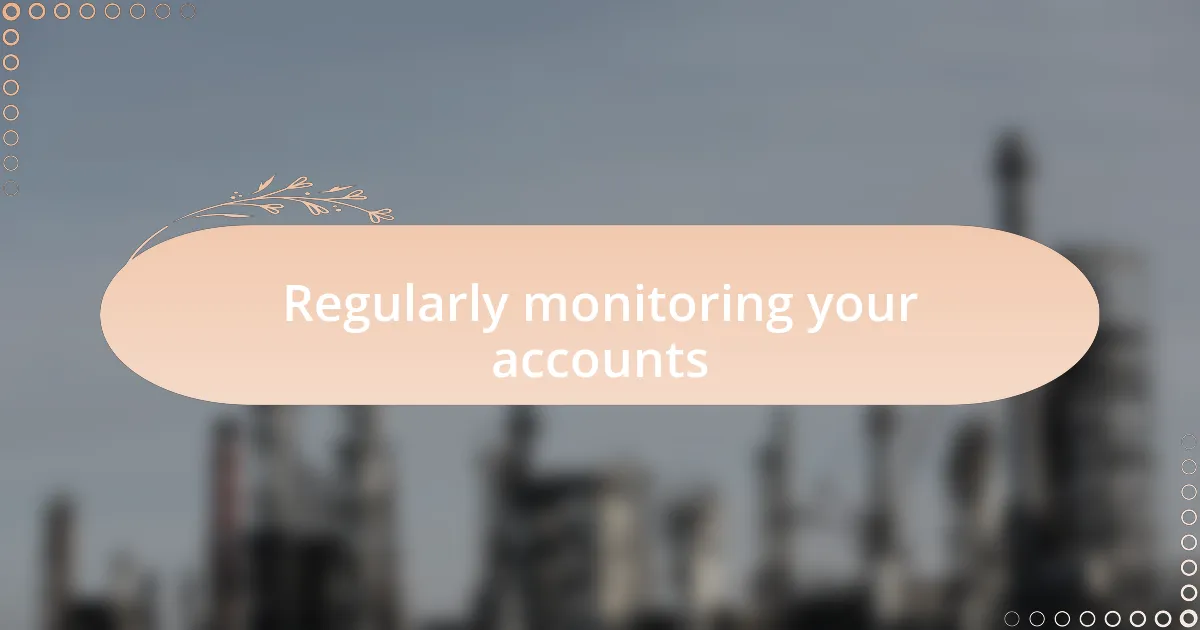
Regularly monitoring your accounts
Regularly monitoring your accounts is crucial in today’s digital age. I remember one morning when I casually opened my mobile banking app, and my heart sank at the sight of a transaction that I definitely hadn’t authorized. It was as if I had stepped into a thriller movie, wondering how I could be so naive. That sudden rush of fear reminded me why it’s vital to keep a regular eye on my transactions. How often do you take a moment to scan your account activity?
I’ve found that setting reminders to review my account weekly has not only kept me informed but also provided peace of mind. During one of those checks, I discovered a small, recurring charge from a subscription I had completely forgotten about. It wasn’t much, but it sparked a realization about how easy it is to lose track of what we’re spending. Don’t you think it’s surprising how a simple act of checking can prevent bigger issues down the road?
I can’t stress enough that being proactive about account monitoring is a form of self-defense against fraud. Once, I found a delayed transaction from a subscription service that was actually a phishing attempt. Thankfully, because I was diligent about checking my accounts, I was able to report it quickly and avert a potential loss. Isn’t it reassuring to know that just a few minutes of your time can save you from hours of stress? Taking charge of your financial safety is truly empowering.